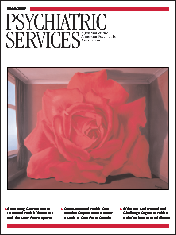Perceived and Measured Stigma Among Workers With Serious Mental Illness
Abstract
OBJECTIVE: This research analyzed the extent to which self-reports of job-related discrimination by persons with serious mental illness are associated with econometric measures of discrimination. METHODS: Data were from the 1994-1995 National Health Interview Survey—Disability Supplement. Data for workers with mood, psychotic, or anxiety disorders (N=1,139) were compared with data for those without such disorders (N=66,341). The main outcome measures were self-reports of wages and stigmatizing experiences in the workplace. RESULTS: After the analyses controlled for functional limitations and job characteristics, no significant difference in mean wages was found between workers with serious mental illness who did not report experiencing stigma and those with no mental illness. In contrast, for all types of mental disorders examined, mean wages for workers with serious mental illness who reported experiencing stigma were significantly lower than mean wages for those with no mental illness. CONCLUSIONS: Workers' self-reports of stigmatizing experiences in the labor market appear to be consistent with econometric measures of the effect of stigma on wages, suggesting that workers know when they are being discriminated against.



